Will CPAP Cause Dry Socket?

There is no evidence that CPAP use alone can cause dry socket. In fact, some studies have shown that CPAP therapy may actually help to prevent dry socket. This is because CPAP therapy can help to keep the mouth moist, which can help to protect the extraction site from drying out.
However, there are some things that can increase your risk of developing dry socket, even if you use CPAP therapy. These include: smoking, drinking alcohol, using straws, rinsing your mouth vigorously, eating spicy or acidic foods, chewing tobacco, having a dry mouth. If you are concerned about developing dry socket, talk to your dentist. They can give you more information about the risks and how to prevent it.
READ MORE: Will CPAP Cause Dry Socket?
Can You Use Purified Water in a CPAP Machine?
Yes, you can use purified water in a CPAP machine. Purified water is water that has been treated to remove impurities, such as minerals, bacteria, and viruses. It is a safe and effective alternative to distilled water, which is the most common type of water used in CPAP machines. There are a few things to keep in mind when using purified water in your CPAP machine:
– Make sure the water is free of impurities. If the water is not pure, it could damage your machine or cause health problems.
– Change the water in your CPAP machine regularly. This will help to prevent the buildup of minerals and bacteria.
– Clean your CPAP machine regularly. This will help to keep it in good working condition and prevent the spread of germs.
If you are unsure whether or not you can use purified water in your CPAP machine, you should consult your doctor or the manufacturer of your machine.
Is there a way to run a CPAP while camping?
Yes, there are a few ways to run a CPAP while camping.
– Use a portable CPAP battery. These batteries are designed to power CPAP machines for up to 12 hours on a single charge. They are typically lightweight and easy to carry, making them ideal for camping trips.
– Use a solar-powered CPAP battery. These batteries use the sun’s energy to charge, so you can power your CPAP machine even when you’re not near an electrical outlet. Solar-powered batteries are typically more expensive than portable batteries, but they can be a great option for campers who want to be environmentally friendly.
– Use a generator. If you have a generator, you can use it to power your CPAP machine. Generators are typically noisy and bulky, so they may not be the best option for all campers.
– Camp at a campsite with electrical hookups. Some campsites have electrical hookups that you can use to power your CPAP machine. This is the easiest and most convenient option for campers, but it may not be available at all campsites.
No matter which option you choose, it’s important to make sure that you have enough power to last the night. You don’t want to wake up in the middle of the night with your CPAP machine running out of power.
Here are some additional tips for camping with a CPAP:
– Pack a backup battery. It’s always a good idea to pack a backup battery in case your primary battery dies.
– Clean your CPAP equipment regularly. This will help to prevent the spread of germs and bacteria.
– Find a quiet place to sleep. Noise can disrupt your sleep, so it’s important to find a quiet place to set up your CPAP machine.
– Wear earplugs or a sleep mask. This can help to block out noise and light, which can also disrupt your sleep.
– Talk to your doctor. If you have any concerns about camping with a CPAP, talk to your doctor. They can help you make sure that you’re taking all the necessary precautions.
READ MORE: How to Use CPAP while Camping